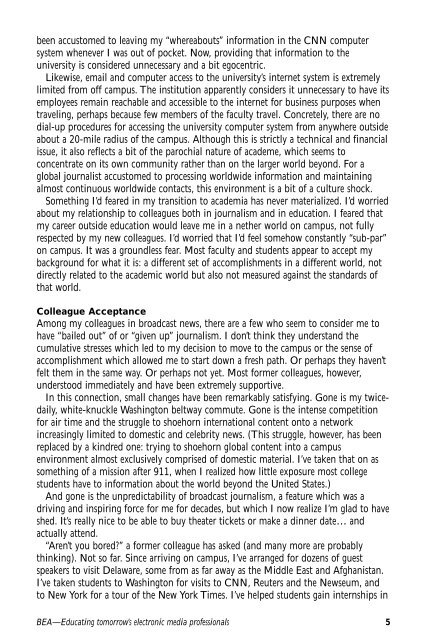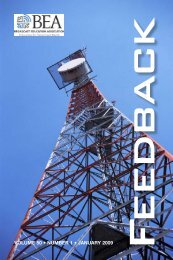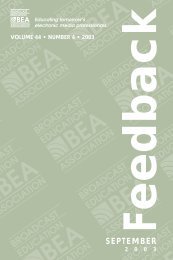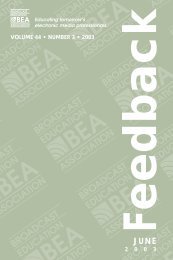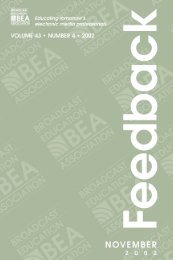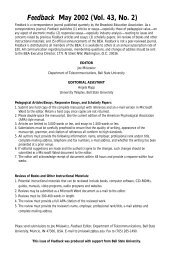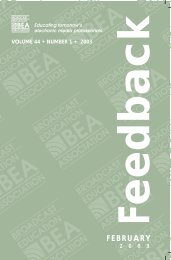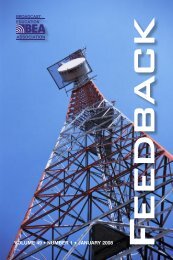university teachers struggle mightily for about six years to impress their colleagues, whoconduct peer reviews. Once favorably reviewed (a cumbersome process involving thecollection of a sort of scrapbook of one’s writing and other activities), faculty aregranted job security for life. This system has strong similarities to communist China’s“iron rice bowl” or the Soviet economic system of job security. Scholars defend thetenure system as an important protection of independent thinking and creativity oncampus, which it surely is. But tenure also shares the Chinese and Soviet drawbacks ofpaying employees regardless of whether they continue to perform at the level theyachieved when they were seeking tenure, and regardless of whether they successfullyengage students in one of the central functions of a university: teaching.I’m not on the “tenure track,” which means my job security is more heavilydependent upon my classroom teaching, my service to the university, and myevaluation by university administrators. That’s a familiar situation for broadcasters likeme, since I spent all of my broadcast journalism career working under a series of threeyearcontracts with no guarantee of job security.Tenure is Scholarship not TeachingInterestingly, the ability for college professors to actually pass on knowledge to studentsthrough teaching is not especially highly valued. I have been told that excellentteaching is not enough to win tenure, while publishing “scholarly” articles is theprimary criterion and will win tenure even if a scholar is not a good teacher.Something of a disappointment among students is their nearly-complete focus on thegrades they earn in class. As I made the transition to academia, I dreamed of engagingstudents in discussion about international political issues and about journalism. Iimagined late-night bar scenes in which groups of students would hotly debate currentaffairs and media problems. I thought my classrooms would be filled with chatterabout how the media affect politics and about how global problems are dealt withthrough negotiations or war.But the reality is that most students don’t engage in debate in class. Most don’tattend after-hours discussions like the ones in my imagination. And most students, likemost Americans, neither know nor care very much about international politics.At first, I attributed this to my inexperience as a teacher. But I’ve come to believe it’snot that. I think students are merely skillful at determining exactly what will improvetheir grade-point average, and focusing on those aspects of college, leavingextracurricular time for non-substantive activities.Among the wonders of academia for me is the extent to which I’m able to determinemy own schedule and life. Gone are the days when beepers, cell phones, digitalmessaging devices and computers tethered me to an assignment desk populated byassistants who didn’t even know what time zone I was in when I called. Gone are thearbitrary directives from a newsroom focused on a single news story, even if it’s not veryimportant (O.J. Simpson comes to mind immediately). Gone is the daily sense oflooming deadline, and gone is the high-intensity tension which accompanies theunplannable and uncontrollable life of a TV news correspondent. (Don’t get me wrong;I enjoyed that life for a long time. But it has its drawbacks.)Instead, I discovered that if I travel off campus, for a speech or a foreign trip, therereally isn’t anyone who wants (or needs) to know where and how to contact me. I’d4Feedback April 2003 (Vol. 44, No. 2)
een accustomed to leaving my “whereabouts” information in the CNN computersystem whenever I was out of pocket. Now, providing that information to theuniversity is considered unnecessary and a bit egocentric.Likewise, email and computer access to the university’s internet system is extremelylimited from off campus. The institution apparently considers it unnecessary to have itsemployees remain reachable and accessible to the internet for business purposes whentraveling, perhaps because few members of the faculty travel. Concretely, there are nodial-up procedures for accessing the university computer system from anywhere outsideabout a 20-mile radius of the campus. Although this is strictly a technical and financialissue, it also reflects a bit of the parochial nature of academe, which seems toconcentrate on its own community rather than on the larger world beyond. For aglobal journalist accustomed to processing worldwide information and maintainingalmost continuous worldwide contacts, this environment is a bit of a culture shock.Something I’d feared in my transition to academia has never materialized. I’d worriedabout my relationship to colleagues both in journalism and in education. I feared thatmy career outside education would leave me in a nether world on campus, not fullyrespected by my new colleagues. I’d worried that I’d feel somehow constantly “sub-par”on campus. It was a groundless fear. Most faculty and students appear to accept mybackground for what it is: a different set of accomplishments in a different world, notdirectly related to the academic world but also not measured against the standards ofthat world.Colleague AcceptanceAmong my colleagues in broadcast news, there are a few who seem to consider me tohave “bailed out” of or “given up” journalism. I don’t think they understand thecumulative stresses which led to my decision to move to the campus or the sense ofaccomplishment which allowed me to start down a fresh path. Or perhaps they haven’tfelt them in the same way. Or perhaps not yet. Most former colleagues, however,understood immediately and have been extremely supportive.In this connection, small changes have been remarkably satisfying. Gone is my twicedaily,white-knuckle Washington beltway commute. Gone is the intense competitionfor air time and the struggle to shoehorn international content onto a networkincreasingly limited to domestic and celebrity news. (This struggle, however, has beenreplaced by a kindred one: trying to shoehorn global content into a campusenvironment almost exclusively comprised of domestic material. I’ve taken that on assomething of a mission after 911, when I realized how little exposure most collegestudents have to information about the world beyond the United States.)And gone is the unpredictability of broadcast journalism, a feature which was adriving and inspiring force for me for decades, but which I now realize I’m glad to haveshed. It’s really nice to be able to buy theater tickets or make a dinner date… andactually attend.“Aren’t you bored?” a former colleague has asked (and many more are probablythinking). Not so far. Since arriving on campus, I’ve arranged for dozens of guestspeakers to visit Delaware, some from as far away as the Middle East and Afghanistan.I’ve taken students to Washington for visits to CNN, Reuters and the Newseum, andto New York for a tour of the New York Times. I’ve helped students gain internships inBEA—Educating tomorrow’s electronic media professionals 5
- Page 1 and 2: Educating tomorrow’selectronic me
- Page 3 and 4: CONTENTSESSAYTransitionsRalph J. Be
- Page 5 and 6: ESSAYTRANSITIONSBy Ralph J. Begleit
- Page 7: party. It was a fabulous experience
- Page 11 and 12: ADVISING:THE LITTLE SECRET HIDDEN I
- Page 13 and 14: • Total intake model—all studen
- Page 15 and 16: Response to the survey has never re
- Page 17 and 18: assessment of the Center in conclus
- Page 19 and 20: SENSE-MAKING AND THE PERSONALVIDEO
- Page 21 and 22: database. A limited implementation
- Page 23 and 24: RESEARCHTHE PARTICIPATION OF WOMENI
- Page 25 and 26: Local newsroom employmentIn July 20
- Page 27 and 28: the referral source of each person
- Page 30 and 31: Discussion and ConclusionsOur analy
- Page 32 and 33: Lind, R. A., & Braun, M. J. (1996,
- Page 34 and 35: downloading services. www.schoolsuc
- Page 36 and 37: major professional selling points i
- Page 38 and 39: COURSE GRADINGElement Percent of Du
- Page 40 and 41: REVIEWHyde, Stuart (2003). Idea to
- Page 42 and 43: The primary purpose of this study i
- Page 44 and 45: detailing the number of phone numbe
- Page 46 and 47: these newscasts that “primary”
- Page 48 and 49: As Table 1.3 shows, comparing only
- Page 50 and 51: RESEARCHACCURACY IN LOCAL TELEVISIO
- Page 52 and 53: anked 26 to 50. After eliminating n
- Page 54 and 55: 2. How often do news sources compla
- Page 56 and 57: Participants were asked which one m
- Page 58 and 59:
These stations still archive script
- Page 60 and 61:
TABLE 12002 BEA News Division stude
- Page 62 and 63:
Eiles at WCHS-TV, Portland, Maine.
- Page 64 and 65:
ESSAYWHAT’S OLD IS NEW AGAIN:THE
- Page 66 and 67:
are. If the news agency editor or r
- Page 68 and 69:
said Sagan, just as broadcast chann
- Page 70 and 71:
“We’re perfectly positioned to
- Page 72 and 73:
John Miller, News Director of KTVT-
- Page 74 and 75:
CLASSROOMGUEST SPEAKERS IN BROADCAS
- Page 76 and 77:
students just starting out, their m
- Page 78 and 79:
professionals, often with varied jo
- Page 80 and 81:
District NewsTo the members of Dist
- Page 82 and 83:
several held on college campuses. I
- Page 84 and 85:
2ND PLACE: Jillian Oppegard, Colora
- Page 86 and 87:
Faculty News CompetitionC.A. Tuggle
- Page 88 and 89:
AWARD OF EXCELLENCE: Kevin Hager, W
- Page 90 and 91:
BEA PRESIDENT’S MESSAGEGOALS AND
- Page 92:
THANK YOU to the following individu


